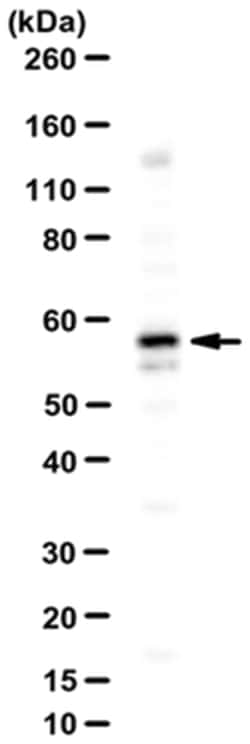Promotional price valid on web orders only. Your contract pricing may differ. Interested in signing up for a dedicated account number?
Learn More
Learn More
MilliporeSigma™ Rabbit anti-Bora, Polyclonal,
Rabbit Polyclonal Antibody
Supplier: MilliporeSigma™ ABE1858
Description
Specifically detects Bora in Human samples, and it is validated for Immunoprecipitation, Western Blotting
Protein aurora borealis (UniProt Q6PGQ7; also known as HsBora) is encoded by the BORA (also known as C13orf34) gene (Gene ID 79866) in human. Originally identified as a co-factor for Aurora A-dependent asymmetrical cell divisions, Bora is an adaptor/scaffold protein that plays an important role in mitosis by mediating Aurora A-dependent Plk1 activation, and Bora depletion abolishes both Plk1 and Cdk1 activation. Cellular Bora activity is negarively regulated by Plk1- and Cdk1-mediated phosphorylation. Cdk1 initially phosphorylates Bora on S252, which primes Bora for Plk1-catalyzed S497 and T501 phosphorylation, leading to SCFβTrCP-mediated Bora ubiquitination and subsequent proteasomal degradation. The negative feed-back regulation of Bora by the kinase it activates is important, as uncontrolled Bora overexpression perturbs Aurora A and Plk1 localization, leading to lengthened metaphase. Similar to the counter regulation between Bora and Cdk1/Plk1 in somatic cells, Bora degradation is reported to be regulated via phosphorylation by Cdk1 and Plx1 in xenopus ooctyes. Cdk1 is reported to phosphorylate Bora on Thr52, which blocks its degradation. Fertilization induced calcium surge jump-starts the oscillations of the embryonic cycles by inducing Calcineurin-catalyzed Bora pThr52 dephosphorylation, leading to Bora degradation.
Specifications
| Bora | |
| Polyclonal | |
| Q6PGQ7 | |
| Rabbit | |
| Unpurified | |
| RUO | |
| Primary | |
| Human | |
| Serum |
| Immunoprecipitation, Western Blot | |
| Rabbit polyclonal antibody in serum with 0.05% sodium azide. | |
| BORA; C13orf34 | |
| GST-tagged recombinant human Bora N-terminal fragment. | |
| 100 μL | |
| Epigenetics and Nuclear Function | |
| NP_079084 | |
| Stable for one year at -20°C from date of receipt. Handling Recommendations: Upon receipt and prior to removing the cap centrifuge the vial and gently mix the solution. Aliquot into microcentrifuge tubes and store at -20°C. Avoid repeated freeze/thaw cycles which may damage IgG and affect product performance. |
Product Content Correction
Your input is important to us. Please complete this form to provide feedback related to the content on this product.
Product Title
For Research Use Only
Spot an opportunity for improvement?Share a Content Correction
